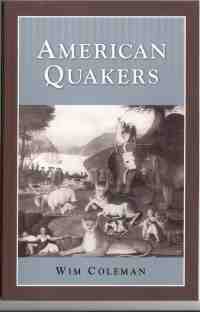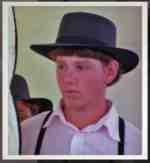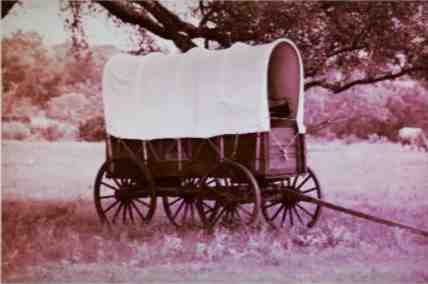from Graham Garner
with Chel Avery
Just two (and a half) new books to introduce this month―but they are exceptionally good. Each, in its own way, is a basic resource on Quakerism.
![Quakers Quakers]() Shire Books is a tiny British publisher which started off by publishing small but learned pamphlets on such topics as windmills and carrier bicycles. I (Graham) used to sell some of them in the Quaker Bookshop in London, and I remember them saying they planned to do one on Quakers. Well almost thirty years later it has arrived. The booklet has a British tinge, but also talks about American Quakers, and it is an excellent resource. The text is lively and well informed, and they have found many new illustrations. My favorite a cartoon of Richard Nixon above the words “old fashioned Quaker Oafs.” Quakers is historical enough for school projects and spiritual enough to be an introduction for adults―and it is only $12.95. The author, I believe, is not a Friend, but he has deep admiration for them.
Shire Books is a tiny British publisher which started off by publishing small but learned pamphlets on such topics as windmills and carrier bicycles. I (Graham) used to sell some of them in the Quaker Bookshop in London, and I remember them saying they planned to do one on Quakers. Well almost thirty years later it has arrived. The booklet has a British tinge, but also talks about American Quakers, and it is an excellent resource. The text is lively and well informed, and they have found many new illustrations. My favorite a cartoon of Richard Nixon above the words “old fashioned Quaker Oafs.” Quakers is historical enough for school projects and spiritual enough to be an introduction for adults―and it is only $12.95. The author, I believe, is not a Friend, but he has deep admiration for them.
![Gulley Gulley]() Another introductory book is part of a new series that aims to help Christians—or indeed anyone—understand all the different denominations now encompassed within (and slightly outside) the Christian sphere. The Quaker entry in this series is by Phil Gulley, a Quaker pastor from Indiana well known to Friends for his sometimes controversial but refreshing books on Christianity, as well as his series of Harmony novels.
Gulley’s light and humorous touch is visible again here as he explains Quakers and their beliefs and testimonies. By using examples from his own life and local community, he deals with difficult and challenging topics in a book that is easy to read. I think that any Quaker will profit from reading this book and can find in it inspiration for that most difficult of tasks: talking to others about what it means to be a Quaker. I give Living the Quaker Way: Timeless Wisdom for a Better Life Today five stars and two thumbs up.
Another introductory book is part of a new series that aims to help Christians—or indeed anyone—understand all the different denominations now encompassed within (and slightly outside) the Christian sphere. The Quaker entry in this series is by Phil Gulley, a Quaker pastor from Indiana well known to Friends for his sometimes controversial but refreshing books on Christianity, as well as his series of Harmony novels.
Gulley’s light and humorous touch is visible again here as he explains Quakers and their beliefs and testimonies. By using examples from his own life and local community, he deals with difficult and challenging topics in a book that is easy to read. I think that any Quaker will profit from reading this book and can find in it inspiration for that most difficult of tasks: talking to others about what it means to be a Quaker. I give Living the Quaker Way: Timeless Wisdom for a Better Life Today five stars and two thumbs up.
![american quakers american quakers]() The “half” book is a second edition of American Quakers from the “Perspectives on History” series of HistoryCompass. This series is an educational resource for ages 12–adult in which primary source material is interlaced with background explanation. The new edition has some small changes, but the greatest improvement is in its appearance, with a better layout and cleaner typography, making it much more inviting to read. It includes the voices of historical figures, ranging from Benjamin Franklin’s account of his first day in Philadelphia through Edwin Bronner’s memories of the Vietnam War Moratorium, and there is a section on Quakers in literature, including passages from Nathanial Hawthorne, Herman Melville, John Greenleaf Whittier, and Jessamyn West. In 86 pages, editor Wim Coleman packs in a wealth of first hand material on the ways that Quakers have been part of American history.
Opening Doors to Quaker Worship returns . . .
The “half” book is a second edition of American Quakers from the “Perspectives on History” series of HistoryCompass. This series is an educational resource for ages 12–adult in which primary source material is interlaced with background explanation. The new edition has some small changes, but the greatest improvement is in its appearance, with a better layout and cleaner typography, making it much more inviting to read. It includes the voices of historical figures, ranging from Benjamin Franklin’s account of his first day in Philadelphia through Edwin Bronner’s memories of the Vietnam War Moratorium, and there is a section on Quakers in literature, including passages from Nathanial Hawthorne, Herman Melville, John Greenleaf Whittier, and Jessamyn West. In 86 pages, editor Wim Coleman packs in a wealth of first hand material on the ways that Quakers have been part of American history.
Opening Doors to Quaker Worship returns . . .
![opening doors opening doors]() . . . as a downloadable pdf. This popular 1994 resource from FGC’s Religious Education program has been out of print for several years, and we’ve finally given into the demands of people who still want it. Written for parents, teachers, and those with an interest in a multigenerational meeting community, it introduces ways of making the practice of Quaker worship accessible to children. The book includes perspectives on how children's experience of worship change at different developmental levels, from preschool into the teen years, and describes many activities and approaches for discovering the depths of worship. Get it here.
. . . as a downloadable pdf. This popular 1994 resource from FGC’s Religious Education program has been out of print for several years, and we’ve finally given into the demands of people who still want it. Written for parents, teachers, and those with an interest in a multigenerational meeting community, it introduces ways of making the practice of Quaker worship accessible to children. The book includes perspectives on how children's experience of worship change at different developmental levels, from preschool into the teen years, and describes many activities and approaches for discovering the depths of worship. Get it here.
![SF video 2 SF video 2]() The Snake Fence - A Movie?
The school district in Sarasota, Florida, has “adopted” The Snake Fence, Janet Olshewky’s novel for young adult readers set in Pennsylvania during the French and Indian Wars. Students turned the story into a play they performed,
The Snake Fence - A Movie?
The school district in Sarasota, Florida, has “adopted” The Snake Fence, Janet Olshewky’s novel for young adult readers set in Pennsylvania during the French and Indian Wars. Students turned the story into a play they performed, ![SF video 3 SF video 3]() casting young actors without reference to race or gender! We are most delighted with the “trailer” created by seventh grader Rose Milner. For the two-and-a-half-minute version of this exciting story about the adventures and ethical challenges faced by a Quaker boy in 1755, watch this: http://animoto.com/play/Dg41SL4DfxkKLnwXkrwvoQ
casting young actors without reference to race or gender! We are most delighted with the “trailer” created by seventh grader Rose Milner. For the two-and-a-half-minute version of this exciting story about the adventures and ethical challenges faced by a Quaker boy in 1755, watch this: http://animoto.com/play/Dg41SL4DfxkKLnwXkrwvoQ
 Shire Books is a tiny British publisher which started off by publishing small but learned pamphlets on such topics as windmills and carrier bicycles. I (Graham) used to sell some of them in the Quaker Bookshop in London, and I remember them saying they planned to do one on Quakers. Well almost thirty years later it has arrived. The booklet has a British tinge, but also talks about American Quakers, and it is an excellent resource. The text is lively and well informed, and they have found many new illustrations. My favorite a cartoon of Richard Nixon above the words “old fashioned Quaker Oafs.” Quakers is historical enough for school projects and spiritual enough to be an introduction for adults―and it is only $12.95. The author, I believe, is not a Friend, but he has deep admiration for them.
Shire Books is a tiny British publisher which started off by publishing small but learned pamphlets on such topics as windmills and carrier bicycles. I (Graham) used to sell some of them in the Quaker Bookshop in London, and I remember them saying they planned to do one on Quakers. Well almost thirty years later it has arrived. The booklet has a British tinge, but also talks about American Quakers, and it is an excellent resource. The text is lively and well informed, and they have found many new illustrations. My favorite a cartoon of Richard Nixon above the words “old fashioned Quaker Oafs.” Quakers is historical enough for school projects and spiritual enough to be an introduction for adults―and it is only $12.95. The author, I believe, is not a Friend, but he has deep admiration for them.
 Another introductory book is part of a new series that aims to help Christians—or indeed anyone—understand all the different denominations now encompassed within (and slightly outside) the Christian sphere. The Quaker entry in this series is by Phil Gulley, a Quaker pastor from Indiana well known to Friends for his sometimes controversial but refreshing books on Christianity, as well as his series of Harmony novels.
Gulley’s light and humorous touch is visible again here as he explains Quakers and their beliefs and testimonies. By using examples from his own life and local community, he deals with difficult and challenging topics in a book that is easy to read. I think that any Quaker will profit from reading this book and can find in it inspiration for that most difficult of tasks: talking to others about what it means to be a Quaker. I give Living the Quaker Way: Timeless Wisdom for a Better Life Today five stars and two thumbs up.
Another introductory book is part of a new series that aims to help Christians—or indeed anyone—understand all the different denominations now encompassed within (and slightly outside) the Christian sphere. The Quaker entry in this series is by Phil Gulley, a Quaker pastor from Indiana well known to Friends for his sometimes controversial but refreshing books on Christianity, as well as his series of Harmony novels.
Gulley’s light and humorous touch is visible again here as he explains Quakers and their beliefs and testimonies. By using examples from his own life and local community, he deals with difficult and challenging topics in a book that is easy to read. I think that any Quaker will profit from reading this book and can find in it inspiration for that most difficult of tasks: talking to others about what it means to be a Quaker. I give Living the Quaker Way: Timeless Wisdom for a Better Life Today five stars and two thumbs up.
 The “half” book is a second edition of American Quakers from the “Perspectives on History” series of HistoryCompass. This series is an educational resource for ages 12–adult in which primary source material is interlaced with background explanation. The new edition has some small changes, but the greatest improvement is in its appearance, with a better layout and cleaner typography, making it much more inviting to read. It includes the voices of historical figures, ranging from Benjamin Franklin’s account of his first day in Philadelphia through Edwin Bronner’s memories of the Vietnam War Moratorium, and there is a section on Quakers in literature, including passages from Nathanial Hawthorne, Herman Melville, John Greenleaf Whittier, and Jessamyn West. In 86 pages, editor Wim Coleman packs in a wealth of first hand material on the ways that Quakers have been part of American history.
Opening Doors to Quaker Worship returns . . .
The “half” book is a second edition of American Quakers from the “Perspectives on History” series of HistoryCompass. This series is an educational resource for ages 12–adult in which primary source material is interlaced with background explanation. The new edition has some small changes, but the greatest improvement is in its appearance, with a better layout and cleaner typography, making it much more inviting to read. It includes the voices of historical figures, ranging from Benjamin Franklin’s account of his first day in Philadelphia through Edwin Bronner’s memories of the Vietnam War Moratorium, and there is a section on Quakers in literature, including passages from Nathanial Hawthorne, Herman Melville, John Greenleaf Whittier, and Jessamyn West. In 86 pages, editor Wim Coleman packs in a wealth of first hand material on the ways that Quakers have been part of American history.
Opening Doors to Quaker Worship returns . . .
 . . . as a downloadable pdf. This popular 1994 resource from FGC’s Religious Education program has been out of print for several years, and we’ve finally given into the demands of people who still want it. Written for parents, teachers, and those with an interest in a multigenerational meeting community, it introduces ways of making the practice of Quaker worship accessible to children. The book includes perspectives on how children's experience of worship change at different developmental levels, from preschool into the teen years, and describes many activities and approaches for discovering the depths of worship. Get it here.
. . . as a downloadable pdf. This popular 1994 resource from FGC’s Religious Education program has been out of print for several years, and we’ve finally given into the demands of people who still want it. Written for parents, teachers, and those with an interest in a multigenerational meeting community, it introduces ways of making the practice of Quaker worship accessible to children. The book includes perspectives on how children's experience of worship change at different developmental levels, from preschool into the teen years, and describes many activities and approaches for discovering the depths of worship. Get it here.
 The Snake Fence - A Movie?
The school district in Sarasota, Florida, has “adopted” The Snake Fence, Janet Olshewky’s novel for young adult readers set in Pennsylvania during the French and Indian Wars. Students turned the story into a play they performed,
The Snake Fence - A Movie?
The school district in Sarasota, Florida, has “adopted” The Snake Fence, Janet Olshewky’s novel for young adult readers set in Pennsylvania during the French and Indian Wars. Students turned the story into a play they performed,  casting young actors without reference to race or gender! We are most delighted with the “trailer” created by seventh grader Rose Milner. For the two-and-a-half-minute version of this exciting story about the adventures and ethical challenges faced by a Quaker boy in 1755, watch this: http://animoto.com/play/Dg41SL4DfxkKLnwXkrwvoQ
casting young actors without reference to race or gender! We are most delighted with the “trailer” created by seventh grader Rose Milner. For the two-and-a-half-minute version of this exciting story about the adventures and ethical challenges faced by a Quaker boy in 1755, watch this: http://animoto.com/play/Dg41SL4DfxkKLnwXkrwvoQ